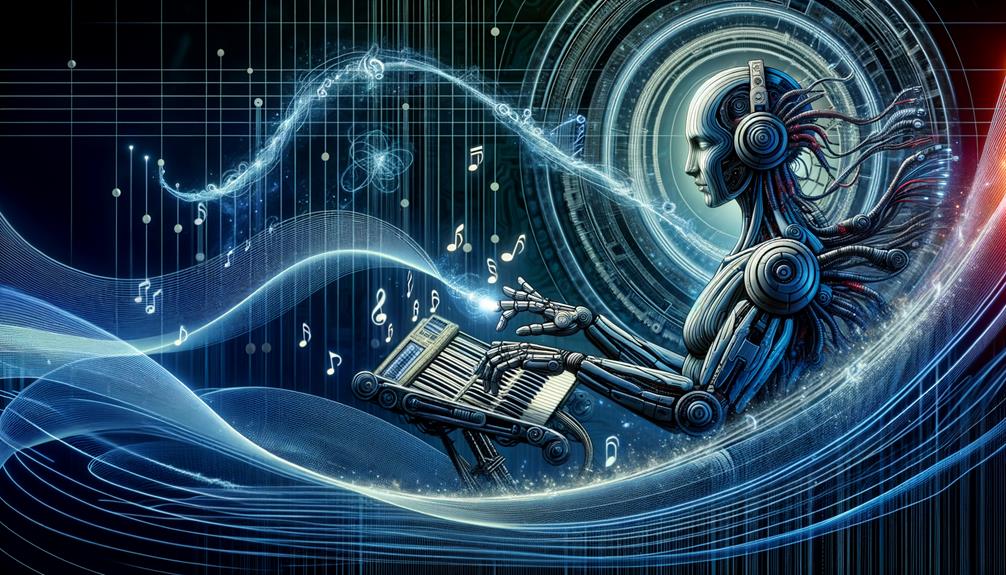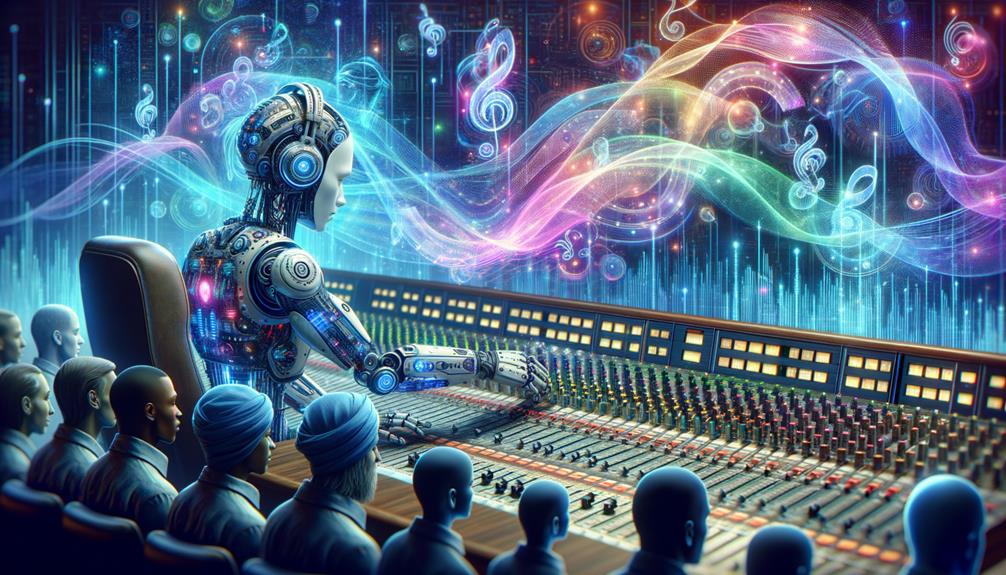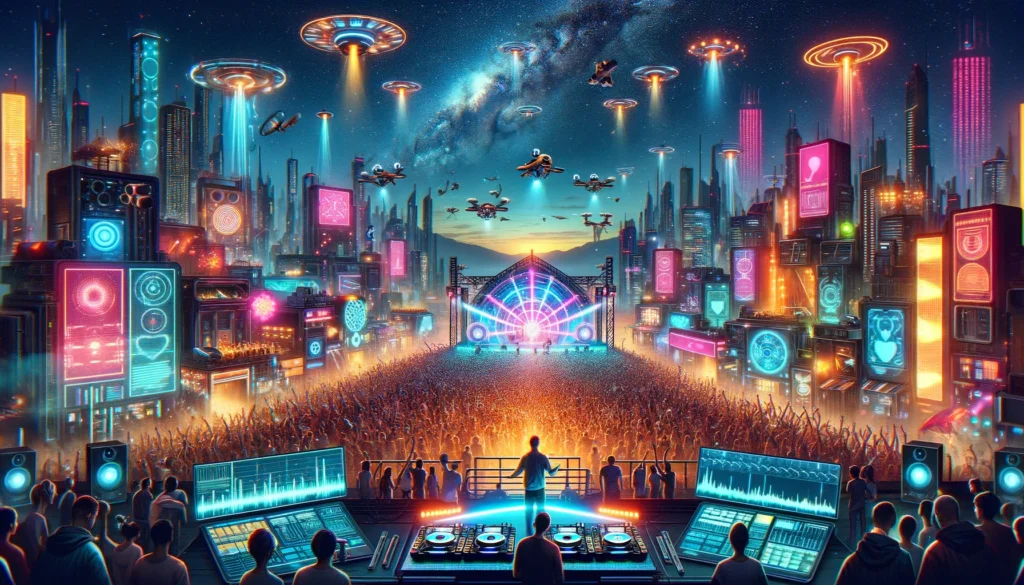No products in the cart.
You tune, you tweak, you perfect; that’s the mantra of any dedicated mastering engineer intent on making a sonic masterpiece. But as you sit there, meticulously adjusting levels and adding that final sheen, you can’t help but wonder if your skills are becoming relics in the face of AI’s relentless advance.
The music industry buzzes with debates on whether artificial intelligence can truly replicate the nuanced ear and seasoned judgment that you bring to the table. Yet, amidst this clash of techno-optimism and staunch traditionalism, the question lingers like the last note of a haunting melody: has AI already edged you out of the picture?
As we peel back the layers of this discussion, you’ll find yourself weighing the evidence, pondering the implications for your craft, and questioning the very future of sound as we know it.
Contents
hide
Key Takeaways
- AI mastering services offer speed and lower costs compared to traditional mastering.
- Traditional mastering engineers provide personalization and understand the subtleties and dynamics of music.
- Human mastering engineers excel in artistic decision-making and emotional communication.
- Automation in music production brings cost efficiency and accessibility benefits, but the emotional depth and creative expertise of humans remain pivotal for high-quality audio mastering.
The Advent of AI Mastering
The emergence of AI mastering services has introduced a transformative and accessible option for musicians looking to finalize their tracks, yet it simultaneously poses questions about the fidelity and nuance of human-crafted sound engineering. Platforms like LANDR and Plugin Alliance’s Mastering Studio harness AI algorithms to simulate the complex choices a mastering engineer makes, automating the process of EQ, compression, and loudness adjustments necessary for track distribution.
You might appreciate the speed and lower costs these services offer, but you should also weigh accessibility concerns. While AI mastering broadens opportunities for artists with limited resources, it lacks the capacity for in-depth, context-sensitive conversations about your music. This one-size-fits-all approach risks compromising the quality of the final product if the input data isn’t meticulously prepared.
Moreover, the music production ecosystem isn’t a static entity. It thrives on innovation, yet the nuanced ear and creative decision making of a skilled mastering engineer continue to be in demand. The bespoke services provided by studios like Abbey Road or Metropolis, involving human professionals, ensure a level of personalized attention that AI currently can’t replicate.
You’re part of an evolving landscape where AI and human expertise coexist, each contributing to the music production ecosystem in unique ways. AI mastering offers you choices and accessibility, but it also stirs debate about the potential loss of personal connection and the subtleties of creative decision making in music. As you navigate this terrain, you’ll realize the value of maintaining a balance between embracing new technologies and honoring the irreplaceable touch of human mastery.
Impact on Traditional Mastering
As AI mastering services like LANDR and eMastered gain traction, they’re reshaping the landscape of traditional mastering by offering a faster, more cost-effective approach, yet they cannot replace the nuanced expertise of seasoned mastering engineers. The role of technology in mastering is undeniable, with AI providing new tools that promise efficiency and convenience. However, listener preferences often lean towards the warmth and depth that only the human touch can inject into a track.
Traditional mastering engineers bring a level of personalization that AI can’t replicate, understanding the subtleties and dynamics of a musical piece. This importance of human touch is reflected in the evolution of the mastering process, which has always adapted to new technologies while retaining the essential human element.
Moreover, AI and human mastering engineers can collaborate, merging the speed and accessibility of AI with the creative and technical prowess of humans. This hybrid approach might just represent the future of mastering, where the strengths of both are utilized to their fullest.
Consider the following table highlighting differences and potential areas for collaboration:
| AI Mastering Services | Human Mastering Engineers |
| Quick and affordable | Provide personalized feedback |
| Algorithm-based processing | Creative decision-making skills |
| Accessibility to music makers | Connection between music and listener |
Quality Comparison: Human Vs. AI
When comparing the quality of AI-driven and human mastering services, it’s essential to consider not only the final sound but also the depth of expertise and creative nuances infused by a professional engineer. Human mastering engineers excel in artistic decision-making, applying their seasoned ears to shape the emotional communication between the music and its audience. They understand the subtleties that can’t be quantified, interpreting the artist’s intent and translating it into sonic reality.
On the other hand, AI mastering services, facilitated by accessible technology, have democratized music production. Tools like LANDR and eMastered offer quick and affordable mastering solutions. They employ AI algorithms to analyze and process tracks, ensuring technical standards are met. However, these services may encounter technical limitations, as they rely on pre-determined criteria and lack the ability to make spontaneous creative choices.
The crux of listener satisfaction hinges on the music’s ability to convey emotion, a domain where human engineers currently hold the upper hand. Their expertise allows them to navigate the intricate balance between the science and art of mastering, often making adjustments that an AI mightn’t even recognize as necessary.
Despite fears that AI mastering could overshadow human engineers, there’s a growing consensus that both can coexist. AI mastering isn’t about replacing humans but providing an additional option, especially for those who mightn’t have the resources for professional mastering services. It introduces a novel approach, yet it’s unlikely to fully replicate the nuanced touch of a seasoned mastering engineer. As the technology advances, AI could augment the mastering process, but for now, the emotional depth and creative expertise of humans remain pivotal for the highest echelons of audio mastering.
The Economics of Automation
In today’s rapidly evolving music industry, automated mastering services are reshaping the economics of production by offering cost-effective and time-efficient alternatives to traditional mastering. You’re seeing an industry disruption that’s fueled by automation in music production and technological advancements. As these tools become more sophisticated, they’re changing how music is produced, distributed, and monetized.
Here are four critical economic impacts of this shift:
- Job Market Implications: The rise of automated mastering poses a real challenge to traditional mastering engineers. While the demand for human expertise remains for high-end productions, entry-level positions may see a contraction as AI fills the gap for basic mastering needs.
- Cost Efficiency: For independent artists and small labels, cost is a significant factor. Automated mastering services offer a more affordable option, making professional-sounding music more accessible.
- Industry Disruption: Automation is disrupting the traditional studio model. It’s forcing mastering engineers to diversify their services and add value that can’t be replicated by an algorithm, such as personalized feedback and creative input.
- Technological Advancements: As AI technology continues to advance, it’s likely that automated services will improve in quality and capability, potentially matching and even surpassing what’s possible by human hands in certain aspects.
You must navigate this landscape with a clear understanding that while automation in music production provides significant benefits in cost efficiency and accessibility, it also brings job market implications that can’t be ignored. As an innovator, you’ll leverage these tools to your advantage while staying mindful of the balance between technology and the irreplaceable human touch.
Future Prospects for Engineers
Reflecting on the economic shifts caused by automated mastering, it’s crucial to consider how mastering engineers will adapt and carve out their future in an industry increasingly influenced by AI. Your job security may seem threatened, but it’s the evolving skillsets that will define your role in industry adaptation. You’ll need to understand both the technicalities of AI tools and the nuances that maintain the value of human touch in music.
Mastering engineers are expected to continue thriving due to their irreplaceable blend of technical know-how and artistic judgment. You’ll find that the market differentiates between the efficiency of AI mastering and the bespoke quality that only a human can provide. This environment fosters collaboration opportunities with AI developers, where your expertise can guide the evolution of these tools to better complement human capabilities.
Here’s a concise breakdown of what the future holds:
| Factor | AI Influence | Human Engineer Response |
| Job Security | AI offers accessibility and efficiency | Engineers ensure quality and emotional resonance |
| Evolving Skillsets | Continuous improvement of AI | Engineers learn to integrate AI into their workflow |
| Industry Adaptation | Coexistence with fast, automated options | Engineers offer bespoke, personalized services |
| Collaboration Opportunities | AI as a tool, not a replacement | Engineers work with AI developers to improve outcomes |
Frequently Asked Questions
Can AI Take the Job of an Engineer?
You’re facing AI limitations in replicating human creativity and emotional interpretation. Jobs will evolve, not vanish, as AI’s collaborative potential with mastering engineers redefines the music industry’s technological landscape.
Will AI Replace Engineers?
AI won’t replace engineers; it’ll change job evolution, demanding skill adaptation. You’ll see collaboration potential grow, as AI ethics and human creativity merge, ensuring innovation thrives alongside traditional engineering expertise.
How Good Is AI Mastering?
You’re wondering about AI mastering’s efficacy. While it can enhance sound quality, it lacks the creative input, emotional connection, and human experience that surpass algorithm limits in traditional mastering. It’s innovative yet imperfect.
What Is the Future of Audio Engineering?
You’ll find the future of audio engineering fusing digital creativity with the human touch, prioritizing sound innovation, emotional interpretation, and a collaborative workflow to push boundaries in expressive and technical realms.
Conclusion
In conclusion, while AI mastering offers a cost-effective and time-efficient alternative, it hasn’t rendered human engineers obsolete.
You’re witnessing a shift, not a replacement, as the nuanced ear of a professional still triumphs in quality.
The future likely holds a hybrid approach, blending AI efficiency with human expertise, ensuring your tracks resonate with both precision and soul.
Mastering engineers needn’t fear obsolescence; instead, they must adapt, integrating AI into their refined craft.






